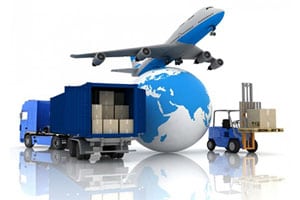Third-party logistics providers (3PLs) have grown tremendously in recent years as the expectations and buying habits of consumers continue to evolve.
According to research from Temando, customer expectations are higher than ever: Retailers’ top concerns in 2016 are meeting these customer expectations (38%) and having an inefficient supply chain (31%). This kind of data shows that customer relationships go beyond the product. They expect not only timely and efficient packing but also affordable packaging.
But if your fulfillment provider is so vital to the success of your ecommerce business, how should you go about evaluating the right options?
The owners of Red Stag have learned this answer the hard way. Red Stag Fulfillment is an ecommerce fulfillment company that was established when the owners of an ecommerce brand couldn’t find a high-quality 3PL to handle its picking, packing, and shipping.
While it eventually established its own 3PL, this isn’t an option for most entrepreneurs, so here’s a few tips on the do’s and don’ts of shopping for a 3PL.
Do define exact and measurable KPIs
It’s hard to evaluate something if you don’t have anything to compare it to. So when shopping for or trying out a 3PL, make sure to set measurable KPIs that will guide your 3PL and give you something to track for efficiency. KPIs can be set up through logs, time stamps and even barcode scanning.
You should also have the ability to measure on-time delivery autonomously. Don’t rely on the reports from the 3PL; request access to this information so you can keep track of how well they’re performing.
Do meet your potential 3PL partners
It’s important that you not only understand how everything works, but how the company manages itself and its workers. When touring the facilities, talk to management about how the employees are compensated and incentivized. Are warehouse workers rewarded for getting orders picked correctly and on time? Or is it all about getting orders out the door? Do you feel they are honest, trustworthy and sincere? Do they show you their passion for the business, and a commitment to customer service? Asking these questions will give you real insight into how your product and business are going to be handled.
Do include systems capability and support as a criterion
Your business is probably prepared for the worst-case scenario, and your 3PL should be, too. Check their criteria for backup systems and plans for when the unexpected take place. For example, if their system crashes do they have an internal IT department or do they outsource?
Check out this ecommerce fulfillment questionnaire for a list of other questions to ask your potential 3PL.
Do understand the 3PL’s ability to scale
Consider the future as well as current state when choosing a 3PL. Your business is probably brainstorming ways to grow right now, so you should be partnering with a 3PL that can handle those future booms. If you have an unexpected massive order volume increase, does your 3PL have the room and manpower to handle it? Will they have a system in place that can get those orders out the door just as quickly as before?
Don’t limit your search to your immediate area
Shipping out of major metropolitan areas like Miami or Los Angeles may seem advantageous but these can actually be the worst places if your customers are spread all over the country. Instead it’s best to look at centrally located cities to drive down shipping costs.
Don’t lock yourself into a long-term contract
Your 3PL has the ability to influence the value of the customer experience. Therefore you should be able to walk away if their service levels waiver at all. What if you scale or have unexpected events? Your 3PL is much too important to your business to be stuck in a contract that can’t accommodate your growth. This is why some ecommerce 3PLs are moving to monthly contracts.
Don’t make a decision based on price rather than value
This isn’t to say the highest quality service can’t be achieved at the lowest price, but it’s rarely the case. What you need to do is properly weigh price with the aspects of your business that are going to be directly affected: Accuracy and customer service.
Take into account strategic buying situations when fast processing in order to have product available to sell is paramount.
You also need to consider the effect on customer service inquiries if 100% of your products ship on time and accurately. That kind of efficiency pays off when you don’t have an entire call center dialed into customers complaining about late or undelivered packages.
Don’t’ make a decision without comparing options
You shouldn’t be afraid to put a few 3PLs on trial periods to test which one works best. In fact, it’s the smartest thing you can do. You want a 3PL that is willing to earn your business over the long haul.
Jake Rheude is director of business development and marketing for Red Stag Fulfillment

